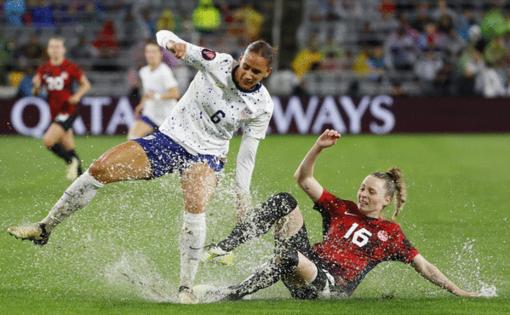Bryce Miller: CONCACAF earns red card for allowing United States and Canada to play on at waterlogged W Gold Cup
Published in Soccer
SAN DIEGO — Red card, CONCACAF. Grab a seat. Shamefully, negligently, unapologetically, you've earned it.
The fact that the regional governing body failed to stop the United States and Canada from playing in an Amazon rain forest during Wednesday's W Gold Cup soccer semifinal at waterlogged Snapdragon Stadium ranked beyond bone-headed.
No matter the highly entertaining finish that saw the Americans win in in a penalty shootout after the teams played to a 2-2 tie, it was flat-out dangerous and inexcusable.
Playing on as the San Diego skies emptied was disgraceful. If the night simply had been altered, that would have been one thing. The game, though, was hardly recognizable as some of the world's best were reduced to stop-and-start, pirouetting Woodstock attendees.
Every moment seemed to be a hamstring or ACL injury in waiting.
Why? Just why?
Passes came with parking brakes. Running resembled Navy SEAL training snapshots. How on earth did the path of least resistance and keeping the trains on time trump safety, especially with the Olympics a mere five months away?
U.S. legend Julie Foudy spoke for everyone with an ounce of sanity on X: "This is so insance. STOP THE MATCH. #uswnt". A few minutes later, the San Diegan added: "Why isn't CONCACAF calling this match. Play it tmrw. Someone is going to get hurt."
"Probably not," U.S. interim coach Twila Kilgore said when asked whether the game should have been played. "But those decisions aren't my decisions. ... It's our job to figure out how to win."
As stadium workers pushed water away with squeegees with the furiousness of curling sweepers at halftime, you wished the handful of them luck.
What happened Wednesday was not soccer — especially in the first half. It was an exercise in survival. It was a sport caught in the churn of an unrelenting washing machine cycle.
How does the U.S. measure where it's at after a stunning shutout loss to Mexico in the group stage finale followed by a dominant 3-0 answer against Colombia? Beyond the grit to withstand all Mother Nature offered, it doesn't.
What is the takeaway for Canada after producing a maple syrup-soaked defensive wall in the tournament coming in, outscoring opponents 14-0? Nada. Zero. Zilch.
Venue press officer Irene Gutierrez said a CONCACAF spokesperson indicated the decision to postpone play rested solely with the referee. The governing body has no say? When safety should be paramount?
The fact that CONCACAF wanted responses to come from a nameless spokesperson said what the organization would not. Accountability? Nah. It was buck passing of the highest order.
When asked whether the referee would be available to discuss the puzzling decision making, as is possible in the MLS, if not FIFA, Gutierrez was told no process is in place.
Tap dance much, CONCACAF? If the flimsiness of it all came from a teenager, they would be grounded for a month.
"You saw it. It was exactly what it looked like," said American striker Sophia Smith, who gave the U.S. a 2-1 lead in extra time before the finishing fireworks arrived. "It was hard. The ball wasn't rolling like how you want the ball to roll. You kind of had to change how you played.
"It wasn't an easy game to play. ... It obviously started down-pouring when we were in the locker room getting ready. Then when we came, we were like, 'Oh, this is bad.'"
A game twisted by the cranky conditions cropped up again and again.
U.S. forward Trinity Rodman chased down a breakaway ball in the 12th minute with only goalkeeper Kailen Sheridan to beat, it stopped in the pooling water as if connected to a boat anchor.
Rodman extended her arms to both sides as if to say, "Why are we playing in this?"
San Diego Wave FC teammate Alex Morgan raced behind the defense shortly after, the water slowed her and the ball as if encountering a sea of brake lights during rush hour on Interstate 15.
When Canadian defender Vanessa Gilles tried to push a ball back to Sheridan in the 22nd minute, it spun like a Masse shot in a smoky billiards parlor.
U.S. forward Jaedyn Shaw kept running before Sheridan could close the unexpected ground; the 19-year-old Wave star poked it past her for the game's first goal.
If not for the marshy spots glistening in multiple spots on the pitch, the U.S. might have scored sooner. Then again, they almost assuredly would not have scored on the ball Shaw ran down.
Scott French, writing for Soccer America, said he had never seen teams play through that much water in high-level competition. He's been covering the sport, for the record, since 1979.
"It was obvious the game was unplayable," Canadian coach Bev Priestman said. "We put in a lot of work in a game plan and within minute one, it's thrown out of the window."
When the rain finally had left to badger communities to the east, Canada found a wet equalizer. Forward Jordyn Huitema uncorked a textbook header off a cross from Ashley Lawrence that knotted things in the 82nd minute.
In extra time — because this night needed that, of course — Smith slipped behind the defense to chip a net finder past Sheridan. Canada capitalized on a penalty call in the final seconds as Adriana Leon buried the shot to keep the drenched night slogging on.
The game proved entertaining in the end, but it demanded a time out. Sort it out a day later when arc-building was not a necessary skill.
The true victory on a soggy and head-scratching night?
No one got hurt.
©2024 The San Diego Union-Tribune. Visit sandiegouniontribune.com. Distributed by Tribune Content Agency, LLC.







Comments